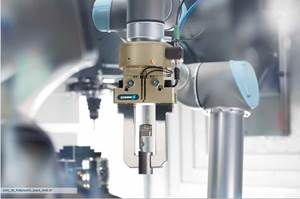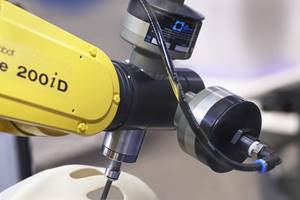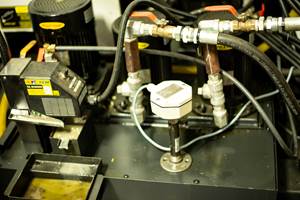Sparking Interest: Robots Attract Students To Manufacturing
Most 12-year-olds don’t ask for a drill press for Christmas. But when Jeffrey Iverson took up robot building last year, a drill press and grinder were high on his wish list.
Share






Hwacheon Machinery America, Inc.
Featured Content
View More

Most 12-year-olds don’t ask for a drill press for Christmas. But when Jeffrey Iverson took up robot building last year, a drill press and grinder were high on his wish list.
Mr. Iverson, now 13, is one of a handful of kids who are so excited about designing, building and competing with their robots that they don’t realize the range of skills they’re learning. “It’s just so much fun,” Iverson says. “I really didn’t know anything about CAD or wiring or machining before I started building robots.”
Mr. Iverson became interested in building robots after watching “BattleBots” on Comedy Central 4 years ago. He read everything he could find about robots on the Internet. Then he headed to the toy store for an RC car and purchased some tin and lexan from a local hardware store. A few weeks later, he introduced his family and friends to his firstborn robot, Spike.
Since then, Mr. Iverson has created two other robots, weighing more than 100 pounds each. One was destroyed in a Mechwars competition, but that didn’t stop Iverson from competing. Instead, he built a third robot that was tougher. To Mr. Iverson’s surprise, his robot took fourth place. “I couldn’t believe I beat a bunch of 40-year-olds.” he says.
Mr. Iverson says teaching himself how to build a robot was one of the hardest things he’s ever done. He learned some lessons the hard way, such as when he attempted to wire two car batteries together. “There’s quite a bit of power in two car batteries—about 600 amps,” he says. “So when I accidentally touched the positive and negative when I was wiring, one of the wires melted completely in half. After that, I learned to be more careful when wiring and to take my time,” Mr. Iverson says.
In addition to hard skills, Mr. Iverson says robot building has taught him soft skills, such as patience, time management and even sales. He has secured sponsorships from NPC Robotics in Mound, Minnesota, and Steel Products and Aluminum Inc. in Edina, Minnesota. Both companies give him a deal on machining the frames of his robots.
Between his industry connections and impressive skill set, Mr. Iverson should have no problem finding a job when he graduates. “I want to be some type of engineer, either electrical or mechanical,” he says.
Kids like Mr. Iverson are the future of the manufacturing industry, says Charles Arnold, executive director of the Minnesota Precision Manufacturing Association (MPMA). “If robots are what it takes to hook kids on manufacturing careers, then we’ll do everything we can to help them,” Mr. Arnold says.
With that in mind, the MPMA hosted the Minnesota BattleBots IQ Expo on September 18, 2003, at the Owatonna Armory in Owatonna, Minnesota. More than 700 students and teachers poured into the gymnasium to cheer for their favorite robots, and guest speakers from Fanuc, PRI Robotics, Lincoln Welders and BattleBots talked about how robots are used in the workplace.
After the competition, students saw how robot-building skills are applied in the manufacturing industry. There was a station at which kids learned more about CAD and a station where they saw a robotic welding arm in action. Technical colleges were also present to encourage students to enroll in their manufacturing programs.
Overall, Mr. Arnold called the event a huge success and a preview of what is to come. “We basically proved our hunch—that robots really do get kids excited about math, science and technology,” he says. “Now we need to get serious about making this activity feasible for every school.”
BattleBots has asked MPMA to co-host the 2004 BattleBots IQ Competition in Minnesota on April 21-24, 2004. (For more information, visit www.battlebotsiq.com/minnesota2004hs.php.) Seeing the competition as an opportunity to promote technical skills to students and administrators, MPMA began calling schools across the state, encouraging them to sign up. In addition, MPMA held workshops for students and educators to teach them the basics of robot building, fundraising and competing. As a result, more than 15 Minnesota teams have signed up to compete, and dozens of other schools are expected to attend the event.
When Mr. Iverson talks about the next robot he wants to build, he can barely contain his excitement. “It’s going to be ultra-fast and be able to drive under all the hazards,” he says. “And the walls of it will be 2 inches thick, so it’ll be almost indestructible.”
But a top-notch robot requires funding. Mr. Iverson plans to raise $4,000 for materials, and he hopes to find a company that will machine the frame of his robot at no cost. That’s a small investment when one considers the return. “I think I’m more sure than ever that being an engineer is something I want to do when I’m older,” Mr. Iverson says.
Workforce development is not an overnight process, says Mr. Arnold, but testing new tactics and techniques gives kids the message that math, science and technology skills are growing more valuable and fun.
Related Content
3 Ways Artificial Intelligence Will Revolutionize Machine Shops
AI will become a tool to increase productivity in the same way that robotics has.
Read MoreLean Approach to Automated Machine Tending Delivers Quicker Paths to Success
Almost any shop can automate at least some of its production, even in low-volume, high-mix applications. The key to getting started is finding the simplest solutions that fit your requirements. It helps to work with an automation partner that understands your needs.
Read MoreHow to Accelerate Robotic Deburring & Automated Material Removal
Pairing automation with air-driven motors that push cutting tool speeds up to 65,000 RPM with no duty cycle can dramatically improve throughput and improve finishing.
Read MoreManaging Coolant with Skimmers, Refractometers and More
Bacteria-infected coolant harms machines and sickens machinists. Coolant management technologies like skimmers and automated systems counter this tendency.
Read MoreRead Next
Building Out a Foundation for Student Machinists
Autodesk and Haas have teamed up to produce an introductory course for students that covers the basics of CAD, CAM and CNC while providing them with a portfolio part.
Read More5 Rules of Thumb for Buying CNC Machine Tools
Use these tips to carefully plan your machine tool purchases and to avoid regretting your decision later.
Read MoreRegistration Now Open for the Precision Machining Technology Show (PMTS) 2025
The precision machining industry’s premier event returns to Cleveland, OH, April 1-3.
Read More






























.jpg;maxWidth=300;quality=90)














